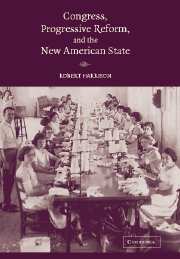Book contents
- Frontmatter
- Contents
- List of Tables
- Preface
- Acknowledgments
- Abbreviations
- Congress, Progressive Reform, and the New American State
- 1 Introduction
- 2 Congress and the Nation
- 3 The Troubled Subject of Railroad Regulation in the Progressive Era
- 4 Congress and the “Labor Question”
- 5 The Ideal of a “Model City”: Congress and the District of Columbia
- 6 The Senate and Progressive Reform
- 7 Patterns of Republican Insurgency in the House of Representatives
- 8 Progressivism, Democratic Style
- 9 Congress, Progressive Reform, and the New American State
- Appendix: The Analysis of Roll Calls
- Index
Appendix: The Analysis of Roll Calls
Published online by Cambridge University Press: 25 July 2009
- Frontmatter
- Contents
- List of Tables
- Preface
- Acknowledgments
- Abbreviations
- Congress, Progressive Reform, and the New American State
- 1 Introduction
- 2 Congress and the Nation
- 3 The Troubled Subject of Railroad Regulation in the Progressive Era
- 4 Congress and the “Labor Question”
- 5 The Ideal of a “Model City”: Congress and the District of Columbia
- 6 The Senate and Progressive Reform
- 7 Patterns of Republican Insurgency in the House of Representatives
- 8 Progressivism, Democratic Style
- 9 Congress, Progressive Reform, and the New American State
- Appendix: The Analysis of Roll Calls
- Index
Summary
Roll call analysis offers considerable advantages in this type of study: it uses information about all the members of a legislative body, not just a few prominent or especially vociferous individuals, enabling a more complete and accurate reconstruction of the distribution of opinion; it facilitates comparison of voting on two or more issues; and it permits analysis of parties and factional groupings. There is a compelling “hardness” about roll call data. Legislators have been set a specific question and have responded yea or nay, not, one hopes, out of whim or fancy, but with due appreciation of the substantive importance and political implications of the subject matter. The interpretation of their responses can proceed without much further reclassification or recoding. This makes them invaluable as a source of evidence about political attitudes, particularly for historical periods when survey and interview data are not available.
A word of caution is in order. In the first place, the questions on which votes were recorded were not selected for the convenience of the historian but often for purely fortuitous reasons, perhaps to drive home a partisan advantage on a point of limited substantive interest. They emerged from a lengthy process of filtration during the course of which many important alternative possibilities were ruled out and others compromised. On many important issues members either avoided having their votes recorded or else doggedly adhered to an agreed party line.
- Type
- Chapter
- Information
- Congress, Progressive Reform, and the New American State , pp. 277 - 280Publisher: Cambridge University PressPrint publication year: 2004



